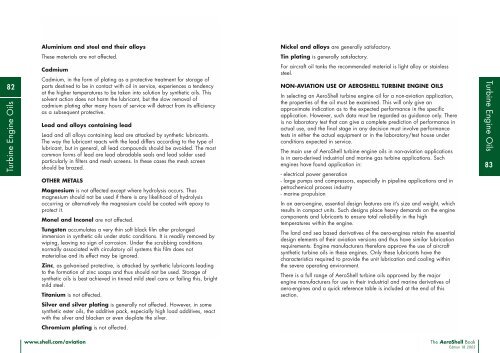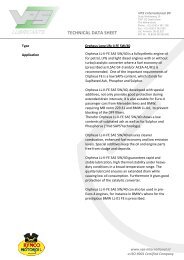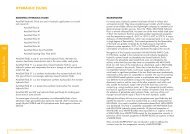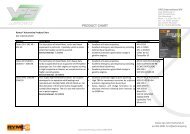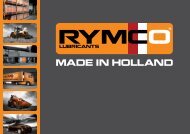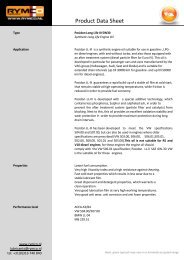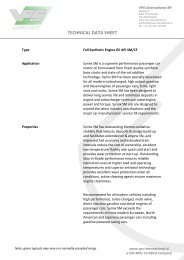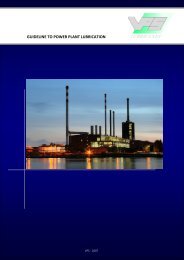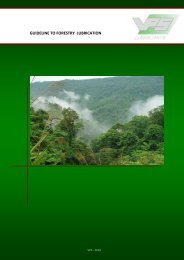Turbine Engine Oils - VPS Lubricants
Turbine Engine Oils - VPS Lubricants
Turbine Engine Oils - VPS Lubricants
Create successful ePaper yourself
Turn your PDF publications into a flip-book with our unique Google optimized e-Paper software.
Aluminium and steel and their alloysThese materials are not affected.Nickel and alloys are generally satisfactory.Tin plating is generally satisfactory.For aircraft oil tanks the recommended material is light alloy or stainlesssteel.82<strong>Turbine</strong> <strong>Engine</strong> <strong>Oils</strong>CadmiumCadmium, in the form of plating as a protective treatment for storage ofparts destined to be in contact with oil in service, experiences a tendencyat the higher temperatures to be taken into solution by synthetic oils. Thissolvent action does not harm the lubricant, but the slow removal ofcadmium plating after many hours of service will detract from its efficiencyas a subsequent protective.Lead and alloys containing leadLead and all alloys containing lead are attacked by synthetic lubricants.The way the lubricant reacts with the lead differs according to the type oflubricant, but in general, all lead compounds should be avoided. The mostcommon forms of lead are lead abradable seals and lead solder usedparticularly in filters and mesh screens. In these cases the mesh screenshould be brazed.OTHER METALSMagnesium is not affected except where hydrolysis occurs. Thusmagnesium should not be used if there is any likelihood of hydrolysisoccurring or alternatively the magnesium could be coated with epoxy toprotect it.Monel and Inconel are not affected.Tungsten accumulates a very thin soft black film after prolongedimmersion in synthetic oils under static conditions. It is readily removed bywiping, leaving no sign of corrosion. Under the scrubbing conditionsnormally associated with circulatory oil systems this film does notmaterialise and its effect may be ignored.Zinc, as galvanised protective, is attacked by synthetic lubricants leadingto the formation of zinc soaps and thus should not be used. Storage ofsynthetic oils is best achieved in tinned mild steel cans or failing this, brightmild steel.Titanium is not affected.Silver and silver plating is generally not affected. However, in somesynthetic ester oils, the additive pack, especially high load additives, reactwith the silver and blacken or even de-plate the silver.Chromium plating is not affected.NON-AVIATION USE OF AEROSHELL TURBINE ENGINE OILSIn selecting an AeroShell turbine engine oil for a non-aviation application,the properties of the oil must be examined. This will only give anapproximate indication as to the expected performance in the specificapplication. However, such data must be regarded as guidance only. Thereis no laboratory test that can give a complete prediction of performance inactual use, and the final stage in any decision must involve performancetests in either the actual equipment or in the laboratory/test house underconditions expected in service.The main use of AeroShell turbine engine oils in non-aviation applicationsis in aero-derived industrial and marine gas turbine applications. Suchengines have found application in:- electrical power generation- large pumps and compressors, especially in pipeline applications and inpetrochemical process industry- marine propulsionIn an aero-engine, essential design features are it’s size and weight, whichresults in compact units. Such designs place heavy demands on the enginecomponents and lubricants to ensure total reliability in the hightemperatures within the engine.The land and sea based derivatives of the aero-engines retain the essentialdesign elements of their aviation versions and thus have similar lubricationrequirements. <strong>Engine</strong> manufacturers therefore approve the use of aircraftsynthetic turbine oils in these engines. Only these lubricants have thecharacteristics required to provide the unit lubrication and cooling withinthe severe operating environment.There is a full range of AeroShell turbine oils approved by the majorengine manufacturers for use in their industrial and marine derivatives ofaero-engines and a quick reference table is included at the end of thissection.<strong>Turbine</strong> <strong>Engine</strong> <strong>Oils</strong>83www.shell.com/aviationThe AeroShell BookEdition 18 2003


